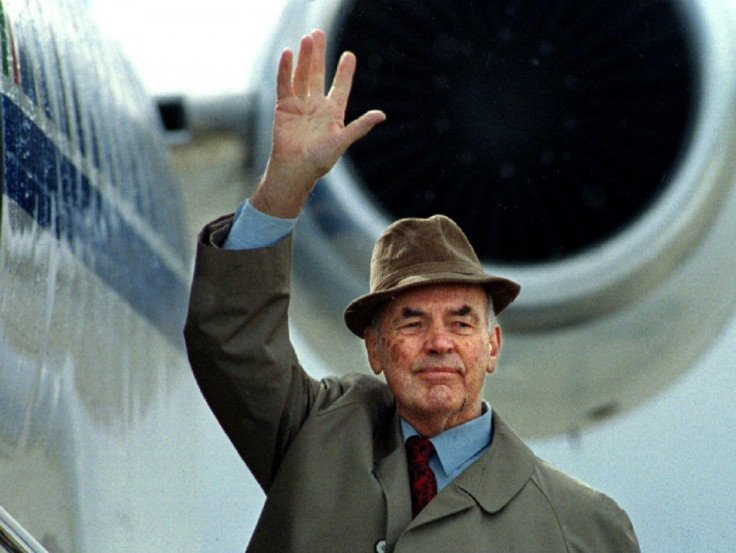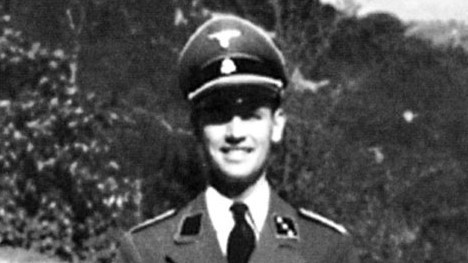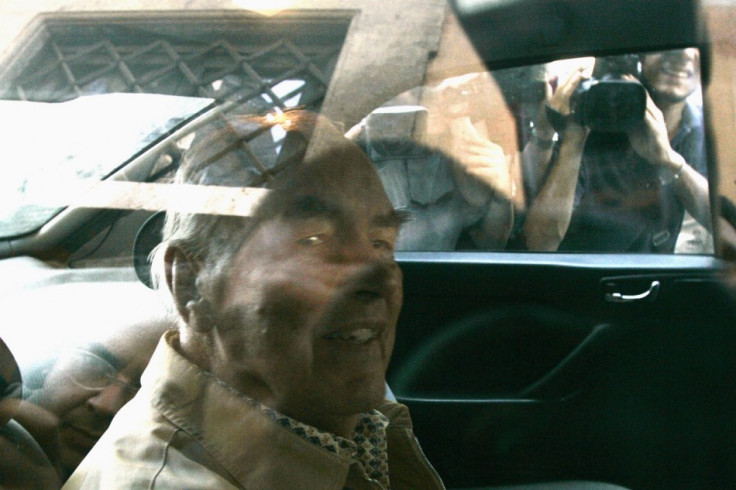Nazi War Criminal Erich Priebke's Last Testament: 'Jews were to Blame for the Holocaust'

Nazi war criminal Erich Priebke died aged 100 in Rome without an iota of remorse for the monumental horrors inflicted by Hitler on European civilisation.
In a written interview recorded a few months before his death, Priebke, who was jailed for life over the execution of hundreds of Italians in the so-called Ardeatine massacre, denied the Holocaust and defends Adolf Hitler and the Nazi ideology.
Asked if he still consider himself a Nazi, Priebke answers: "I've chosen to be myself."
"[Nazism] is my way of looking at the world. It's my ideals, it is what for us, Germans, was the 'Weltanschauung' (worldview), which has to do with honour and self-respect also today."
The text of the interview was given to IBTimes UK by Priebke's lawyer, Paolo Giachini, who was tasked by the former Schutzstaffel (SS) captain with releasing it after his death. He said it is Priebke's "human and political will".
In the interview, Priebke proved an arrogant Nazi monster until his dying day. He claims Jews are partially to blame for the Holocaust, the true extent of which he denies. He reveals himself as an unreconstructed anti-Semite who continued to peddle the lies that stoked the genocide of six million Jews, among them 1.5 million children, as well as millions of Russians, Poles, gypsies and homosexuals.
"Responsibility lies with both parties," he says. "Due to their religious beliefs most Jews considered themselves better and above all other human beings." Priebke adds, though, that he doesn't hate Jews. "There are also good people among them."
"In Germany Jews' behaviour was openly criticised since the early 1900s. They had amassed a huge economic and political power, despite being a scanty part of the world population. This was perceived as unjust.
"It is a fact that even today if you take the 1,000 most powerful and rich individuals in the world, most are Jews," Priebke said..
Priebke claimed that Jewish migrants from Eastern Europe caused "a real catastrophe" in Germany after the First World War.
"They stockpiled huge capital while most of Germans were living in poverty. Moneylenders got richer and annoyance towards Jews grew higher," Priebke says.
Priebke said Hitler tried to persuade Jews to leave Germany peacefully but "had to lock them up in lagers as war enemies" after Kristallnacht, the Night of Broken Glass.
On that night, of 9-10 November 1939, at least 91 Jews were killed and some 30,000 arrested as part of a Nazi pogrom that was purportedly sparked by the killing of a German diplomat, Ernst vom Rath, by German-born Polish Jew Herschel Grynszpan, in Paris.
Jewish stores, synagogues and homes were raided and had their windows smashed, filling streets with broken glass.
That night signalled the beginning of the Holocaust, and the systematic extermination of six million Jews.

Priebke personally oversaw the killing of at least 80 people who died in the Ardeatine massacre in 1944.
Aged 20, Priebke joined Hitler's National Socialist German Workers' Party as it rose to power in 1933.
He was soon spotted by SS chief Heinrich Himmler, who enlisted him into the ranks of the feared Nazi elite military unit, the SS.
During the Second World War he served under the command of Herbert Kappler in Rome.
On 23 March 1944 Keppler ordered the execution of 335 Italians, in retaliation for an attack by partisan troops that had killed 33 German soldiers.
The execution by firing squad was carried out under captain Priebke's supervision in the ancient Ardeatine Caves in central Rome.
At his trial Priebke claimed he had only ticked off the names of those killed from a list that included 12 underage boys, about 80 Jews and a Catholic priest.
His interviewee, whose identity is unknown - according to Giachini might be one of Priebke's relatives - fails to ask him any question on the issue.
Priebke dismissed concentration camps as normal war prisons, saying they featured good kitchens and brothels for the inmates to use.
"To lock up people that were a threat to national security was a normal thing during the war," Priebke said. "Russians and Americans did the same."

He claims the gassing of millions of Jews did not happen and that the existence of gas chambers was invented at the Nuremberg trails of Hitler's top Nazi henchmen.
He describes Nuremberg as a "show trial" and a farce set up to dehumanise Germans and cover up war crimes made by the US and its allies.
"The activity carried out by a gas chamber is invasive towards the environment and terribly dangerous, deadly, also on the outside.
"To kill millions of people this way, in the same place where other work and live, without them to notice anything is absurd," he said.
Priebke claimed he was "dismayed" when he first heard about gas chambers after the end of the war.
He said the world was "brainwashed" by US propaganda to believe that Germans were evil, so that the allies could get away with the indiscriminate bombings of German cities and rule the world undisturbed according to their economic and political interests.
Priebke adds that the Holocaust was Hollywoodised to sell movies and books, which revenue was used to fund the state of Israel.
He dismissed all witnesses' accounts and evidences, including videos and photographs, of cruelties and inhumanities in concentration camps as "false".
At the end of the war Priebke went into hiding in South America. He was discovered working as a school teacher in Argentina in 1994 by an American journalist and was then extradited to Italy.
He was sentenced to life in prison in 1998 but was later allowed to serve his term under house arrest due to his advanced age and poor health.
The interview was recorded in Rome, a few days before Priebke's 100th birthday in July.
On the day of his birthday members of the Italian Jewish community staged a demonstration in front of his house against plans to hold a public celebration.
"When you're a killer age doesn't matter. No birthday parties for the Nazi" a slogan read.
Despite being under house arrest, Priebke's was allowed to go out, do his own shopping and dine at restaurants. His relaxed jail regime was unpopular with many Italians, especially considering of his total lack of remorse.
On Christmas Day a few years ago, people living opposite his house unfurled a banned in front of his window, reading: "Happy Christmas, murderer."
Below is the original text of the interview in Italian.
© Copyright IBTimes 2025. All rights reserved.






















